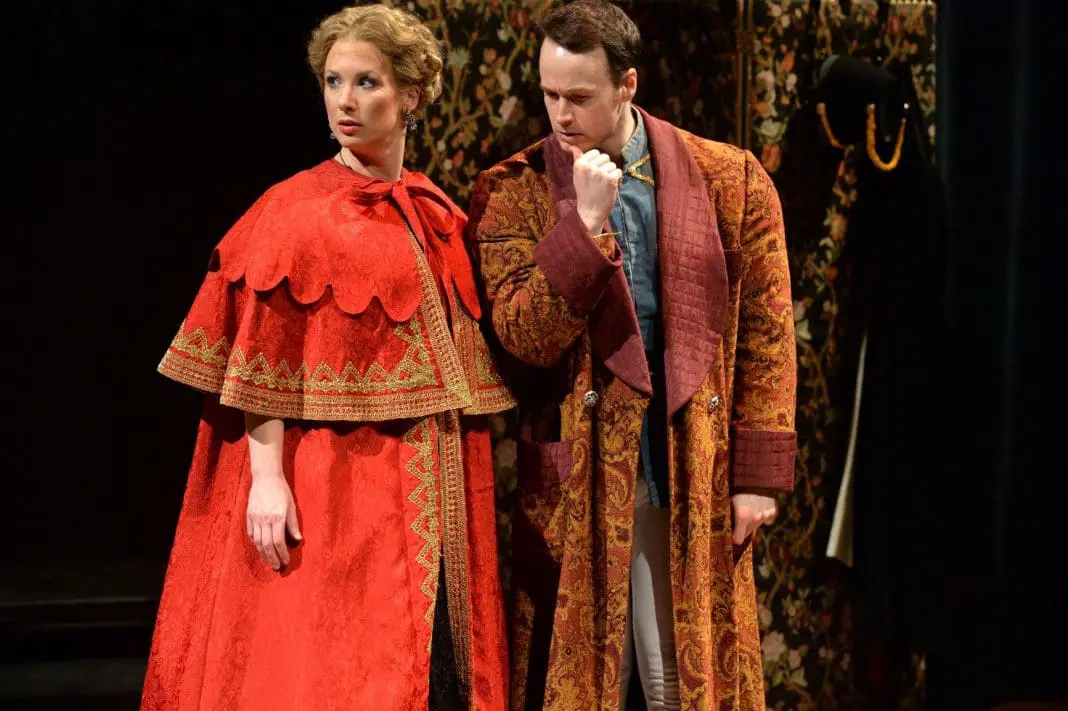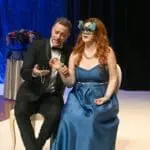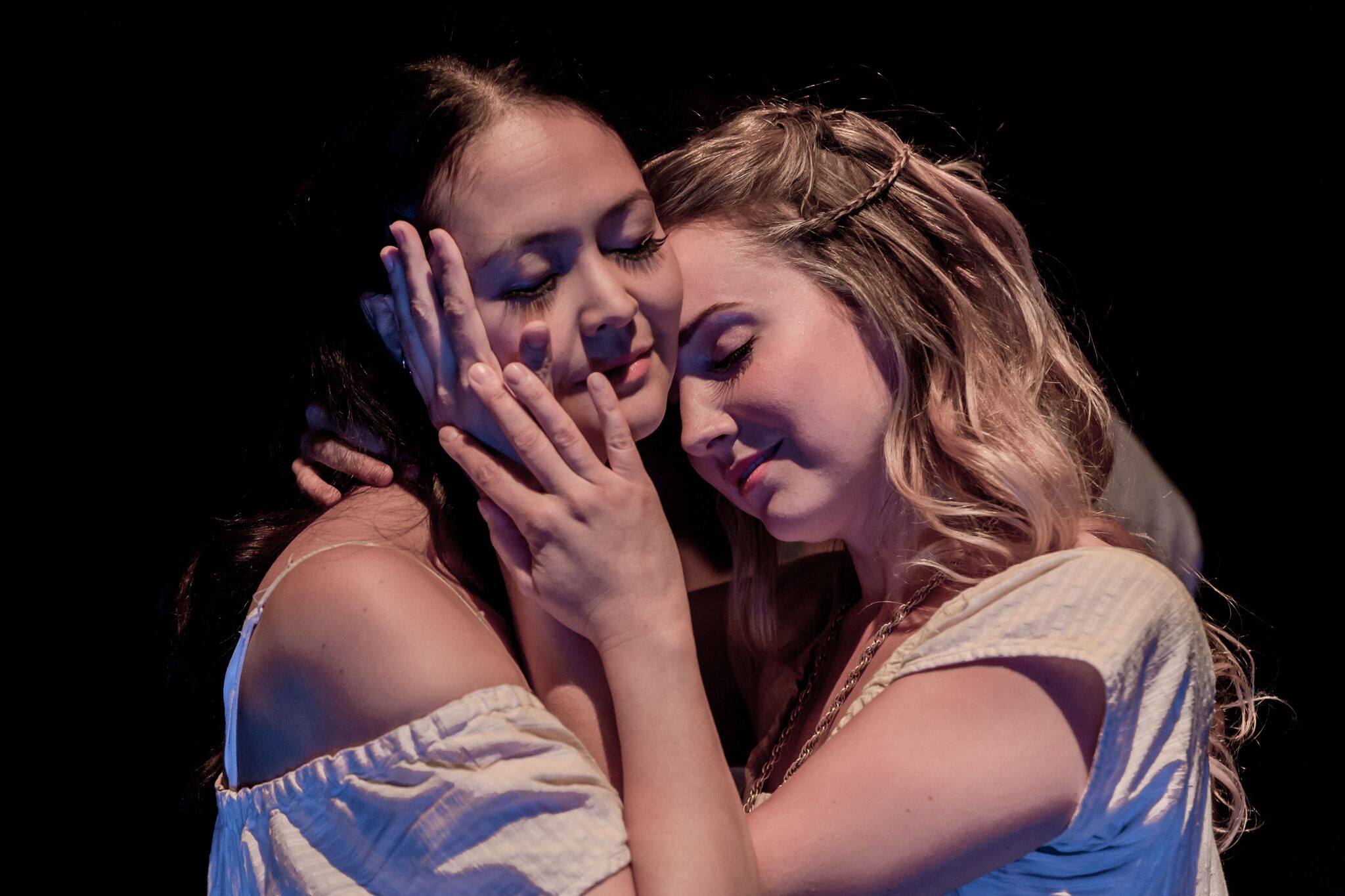Tired out from the Holiday Season festivities? How about something frivolous, frothy and fun to get rid of those post-Christmas blues? It’s always nice to end the year—and 2018 has turned out to be quite the annus horribilis for the world—with some escapist entertainment. Toronto Operetta Theatre‘s (TOT) Die Fledermaus fits the bill. Judging by the full house on opening night (Dec. 28th) and the audience response at the final curtain, I think they agreed.
With Johann Strauss at his most melodically inspired, Die Fledermaus will leave you humming the many hit tunes as you leave the theatre. Add to that the nonstop antics by Eisenstein and Company, here given the trademark Guillermo Silva-Marin treatment, what better way to bid a fond (or not so fond) farewell to 2018? Indeed, this Strauss operetta has been a TOT staple over its 33-year history. According to my count, they’ve stage it four times previously, the last in 2010. In my book this revival was overdue!
This piece demands singers who look and sound good and have a certain dramatic flair. TOT has assembled a strong ensemble cast, led by Adam Fisher as a terrific tenor Eisenstein. This Zwischenfach role is too high for many baritones and too low for lyric tenors. But Fisher was totally up to the task, singing with sturdy, attractive tone, acting up a storm. He exhibits a rare affinity for physical comedy, not always the case with the typical opera singer. Fisher has a great future in musical theatre if he ever chooses to do so.
Equally impressive was the Alfred of tenor Cian Horrobin, an unfamiliar voice to me. He sang with an attractive, ringing tenor, and acted to the hilt the haughty Alfredo (as he was named here), il tenore, complete with a delightfully fake Italian accent, sprouting snippets from Rigoletto and La traviata. Amusingly, in the many Fledermaus productions I’ve seen, this is the first time Rosalinda joins Alfred in duets, from La traviata no less! Also noteworthy was the warm baritone of Michael Robert-Broder as Dr. Falke, who led a very nice “Brüderlein, Schwesterlein” ensemble.

Adam Fisher (Eisenstein) and Lara Ciekiewicz (Rosalinda) in TOT’s Die Fledermaus. Photo: Gary Beechey, BDS Studios
All the supporting men were good, from Frank (Janaka Welihinda) and Dr. Blind (Sean Curran) to the two Ivan’s (Joshua Clemenger and Yervant Khatchadourian). And then there was the over-the-top Frosch of Guillermo Silva-Marin, TOT’s founder. He reprised his Frosch from eight years ago, and it never gets stale. His updated dialogue typically pokes fun at the various social/political transgressors, these days mostly Donald Trump, although for some reason Martha Stewart sneaked in there. Too bad there wasn’t more laughter—I guess there weren’t too many political junkies in the audience! The audience redeemed themselves by giving the singers well deserved ovations at the final curtain.

Caitlin Wood (Adele) and Elizabeth Beeler (Prince Orlofsky) in TOT’s Die Fledermaus. Photo: Gary Beechey, BDS Studios
Among the women, both Lara Ciekiewicz (Rosalinda) and Caitlin Wood (Adele) sang well and acted their scintillating best. Ideally, I would have preferred their timbres to have greater contrast, maybe a lighter-voiced Adele and a more spinto Rosalinda, but that’s a minor quibble. Ciekiewicz sang a very nice “Csárdás,” and she’s adept with the tambourine! Wood’s “Laughing Song” was a highlight. Veteran TOT soprano Elizabeth Beeler made a rare outing in a trouser role as Orlofsky. She looked great, and delivered a convincing fake Russian accent. She didn’t yodel her way through “Chacun à son goût” like most mezzos, although one could tell the music didn’t sit comfortably in her voice, betraying an occasional slow vibrato. Olivia Morton was an engaging Ida, who in this show for some reason is called Sally.
Even with budget constraints, TOT’s rented Malabar costumes were lovely, and the various props used suitably elegant. The singers had good diction, although I did miss surtitles on occasion. Veteran conductor Derek Bate did a fabulous job with the tiny orchestra—which sounded very good even with only 12 players. Die Fledermaus is not exactly short, even with the second intermission cut, it was still a good two and a half hours, but it was two and a half hours well spent. Highly recommended.
Additional performances Dec. 29, 30, 31 and Jan. 2. Click here for more information.
















